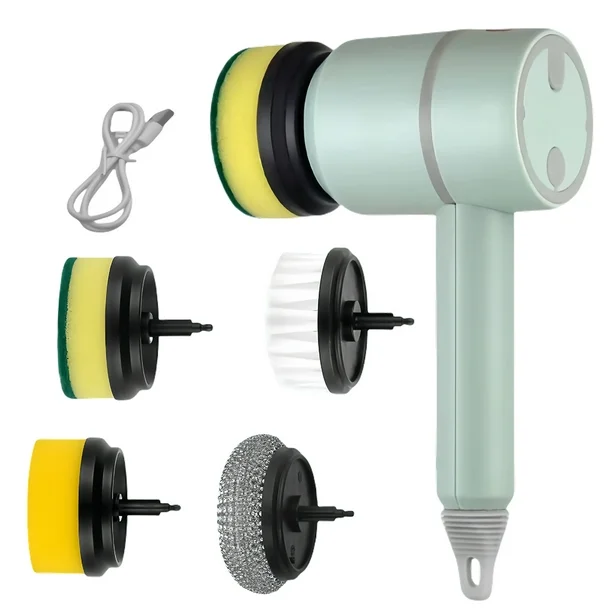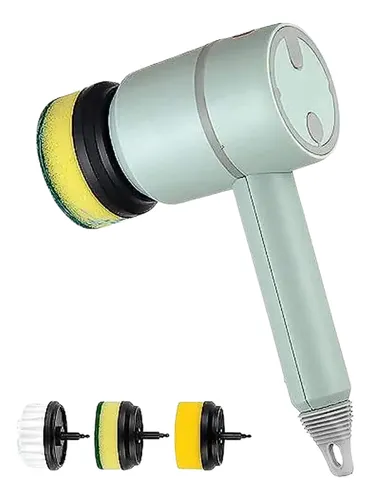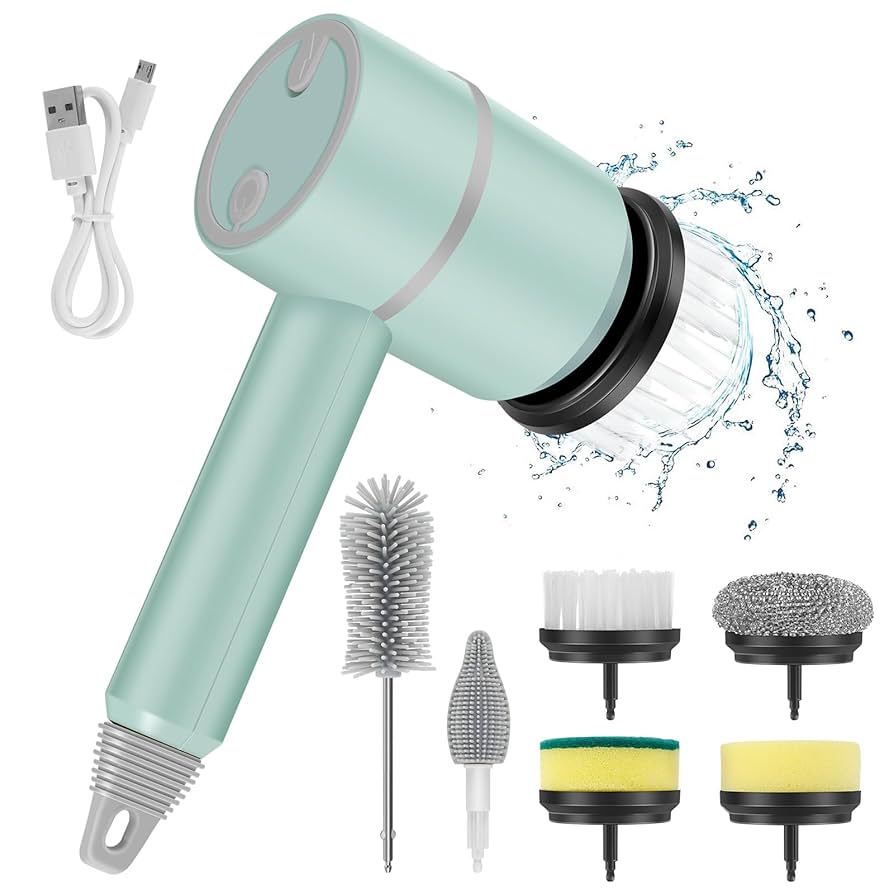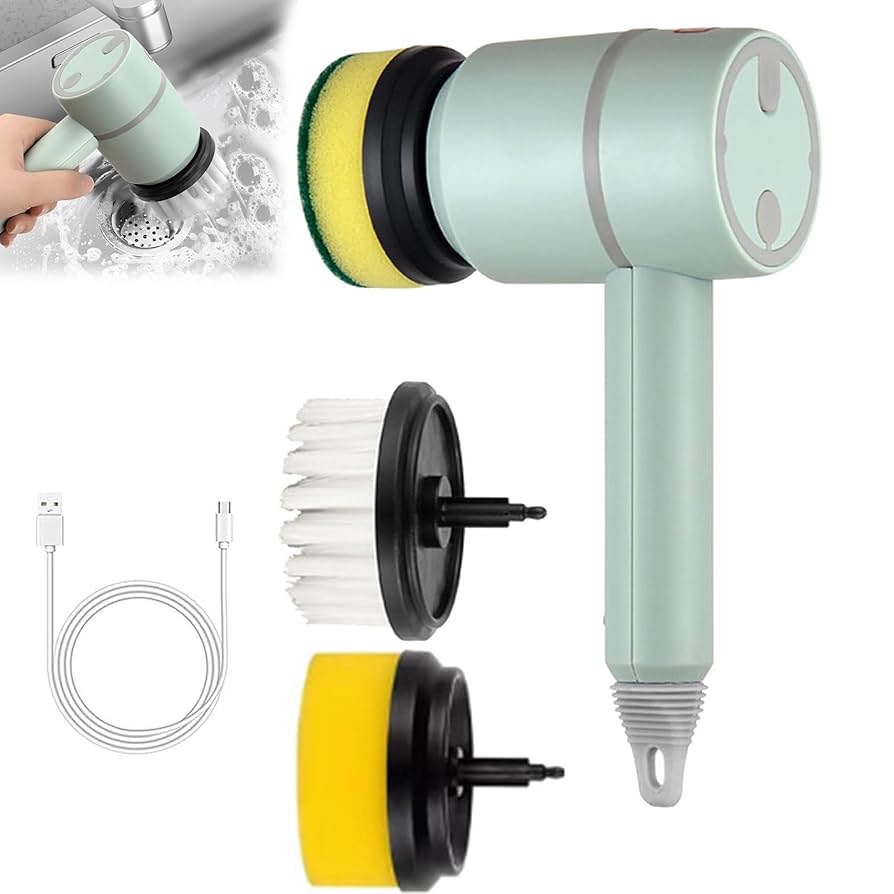Is an Electric Cleaning Brush Safe for Delicate Surfaces
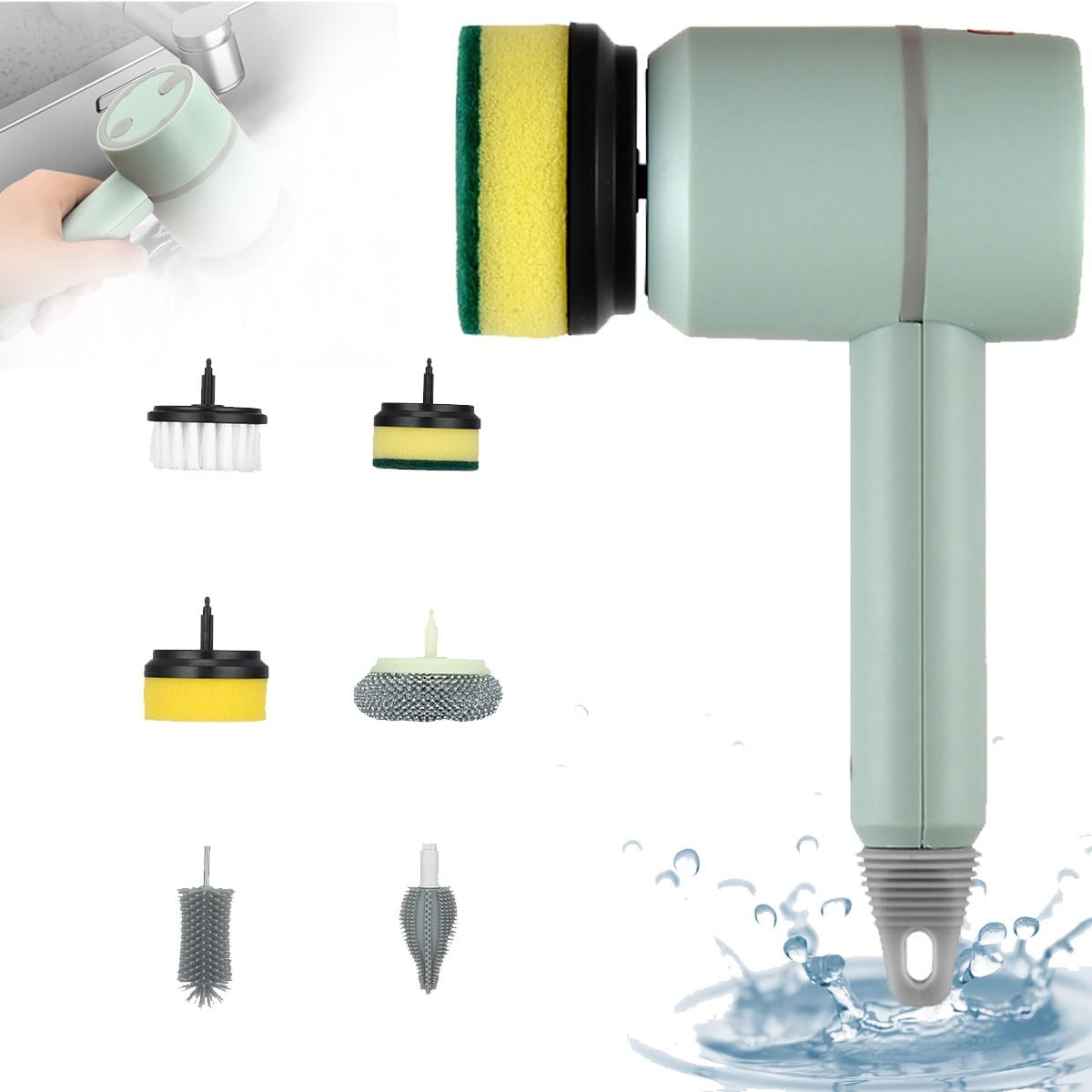
Is an Electric Cleaning Brush Safe for Delicate Surfaces? 5 Reasons Why It Is
When it comes to cleaning delicate surfaces — think glass, tiles, mirrors, stainless steel, or polished wood — most people hesitate to use electric tools. After all, the last thing anyone wants is to leave scratches, dull finishes, or unwanted marks on expensive surfaces. So, the question arises: is an electric cleaning brush safe for delicate surfaces?
The short answer: Yes, when used correctly, an electric cleaning brush can be perfectly safe for delicate surfaces — and even better, it can make your cleaning faster, more effective, and more consistent.
In this post, we’ll explore exactly how these tools work, why they’re safe for various materials, and how to get the best results without damaging your home’s finishes. Let’s dive into the details.
1. Understanding the Electric Brush — What Makes It Different?
To answer whether an electric brush is safe for delicate surfaces, you first need to understand how it’s designed.
An Electric Cleaning Brush isn’t just a powered scrubber. It’s a device engineered to combine controlled rotation speed, customizable brush heads, and consistent pressure — all to deliver a deep clean without relying on brute force.
Unlike traditional scrubbing, which can cause uneven pressure and micro-scratches, these brushes distribute force evenly. The motor maintains a steady rhythm, preventing over-scrubbing or damage to fragile surfaces like ceramic coatings or tempered glass.
Most quality electric cleaning brushes (like those available in Malta at 4Home.mt) come with:
- Soft bristle heads for sensitive materials
- Medium bristles for general use (like tiles or grout)
- Hard bristles for stubborn stains or outdoor cleaning
This versatility means you can tailor the cleaning experience to each surface in your home, ensuring it’s both effective and safe.
2. Why Electric Brushes Are Safe for Most Delicate Surfaces
Let’s get right to the heart of it: is an electric brush safe for delicate surfaces?
Yes — provided you use the right attachments and techniques.
Here’s why they’re generally considered safe:
a. Adjustable Brush Heads
The interchangeable brush heads make a world of difference. For instance, soft nylon or microfiber heads are designed to glide gently across surfaces like mirrors, marble countertops, or chrome fittings without leaving micro-abrasions.
When used on low to medium speed, these heads can remove dirt, soap scum, or grease without scratching or dulling the finish.
b. Low-Speed Settings
Most high-quality electric cleaning brushes feature variable speed controls. Delicate surfaces require slower rotations — think of it as polishing instead of scrubbing.
The lower setting minimizes friction and ensures that even the most sensitive materials (like glass or enamel) remain intact while still being thoroughly cleaned.
c. Consistent Pressure
When cleaning manually, it’s easy to apply inconsistent pressure, especially when you’re tired. Electric cleaning brushes, on the other hand, maintain uniform movement and pressure, which reduces the risk of creating pressure spots or streaks on glass or polished tiles.
d. Waterproof Design
Another reason these brushes are safe is that they’re often IPX-rated waterproof, meaning you can safely use them in wet environments like bathrooms or kitchens without risking electrical issues. This makes them practical for surfaces constantly exposed to water — such as shower glass or ceramic tiles.
3. Surfaces You Can Safely Clean with an Electric Brush
To understand how versatile these devices are, let’s go through the most common surfaces in your home and explore how electric cleaning brushes perform on each.
a. Glass and Mirrors
These are the most delicate surfaces people worry about. Fortunately, when paired with a soft-bristle or microfiber brush head, your electric cleaning brush is gentle enough to remove grime, fingerprints, and water stains without leaving scratches.
Tip: Use a glass-safe cleaning solution and keep the rotation speed low. Avoid pressing down — let the brush do the work.
b. Ceramic and Porcelain Tiles
These are durable but can lose shine over time due to soap scum or hard water buildup. Electric cleaning brushes work wonders here. Medium bristles can scrub away residue efficiently while keeping the tile’s surface safe.
c. Stainless Steel
When cleaned improperly, stainless steel can lose its shine or develop streaks. But with a soft brush head and a non-abrasive cleaner, electric cleaning brushes make polishing easier — and leave a professional-grade finish.
d. Wooden Surfaces
Wood requires caution, but some sealed or varnished wood can handle gentle cleaning with a very soft head and minimal pressure. Always test a small area first, and avoid using water on untreated wood.
e. Shower Screens and Fixtures
An electric cleaning brush is especially useful here. The round brush head can reach tight corners and remove mineral deposits that accumulate around faucets, joints, and frames — all without scratching glass or chrome.
4. Tips to Use an Electric Brush Safely on Delicate Surfaces
Now that you know an electric brush is safe for delicate surfaces, let’s go over the best practices to ensure maximum protection and efficiency.
1. Always Choose the Right Brush Head
Different tasks require different brush types. As a general rule:
- Soft brushes = Glass, mirrors, chrome, wood
- Medium brushes = Tiles, ceramics, plastic
- Hard brushes = Outdoor concrete, grout, metal
Using the correct one is the key to preventing damage.
2. Don’t Apply Extra Force
The beauty of an electric cleaning brush lies in its power. You don’t need to press down. Allow the bristles to spin and glide. Too much pressure can cause wear or leave swirl marks on sensitive surfaces.
3. Use the Right Cleaning Solution
Avoid harsh chemicals, especially on glass or natural stone. Opt for pH-neutral cleaners or mild soaps. This ensures you’re cleaning effectively without stripping finishes.
4. Test First
If you’re unsure, test on a small hidden area before cleaning the entire surface. This is especially important for lacquered or polished finishes.
5. Dry After Cleaning
After using the electric cleaning brush, wipe the surface dry with a microfiber cloth. This prevents water spots, especially on glass, chrome, or tiles.
5. The Hidden Benefits of Using an Electric Brush
Beyond safety, there are several reasons homeowners in Malta are switching to electric cleaning brushes for everyday cleaning tasks.
a. Time-Saving
Electric cleaning brushes can reduce cleaning time by up to 70%. Instead of manually scrubbing soap scum or grime, you simply guide the brush — it does the hard work for you.
b. Energy Efficient
You might think that using a battery-powered tool consumes more energy, but it’s the opposite. The reduced water and detergent usage make it an eco-friendly option.
c. Ergonomic Design
No more bending, stretching, or tiring your wrists. Electric cleaning brushes are designed to make cleaning easier and more comfortable, which is especially appreciated when cleaning bathrooms, tiles, or windows.
d. Consistent Results
Manual cleaning depends on how much effort you put in — but an electric brush gives you professional, uniform results every single time.
6. Safety Precautions — What NOT to Do
Even though an electric cleaning brush is safe for delicate surfaces, there are a few practices to avoid:
- Never use the hard-bristle head on glass or mirrors. It’s meant for grout or outdoor cleaning.
- Avoid using acidic or abrasive cleaners like vinegar or bleach on sensitive materials.
- Don’t submerge the brush handle if it’s not fully waterproof. Check the manufacturer’s guide.
- Keep it away from high heat sources like hair dryers or radiators, as plastic parts can warp.
These small steps ensure your tool lasts longer — and your surfaces stay pristine.
7. The Science Behind Bristle Design and Surface Protection
When people ask, “is an electric brush safe for delicate surfaces?” — the answer depends largely on one thing: the bristle design.
High-quality electric cleaning brushes use engineered bristles made from flexible synthetic fibers, usually nylon or thermoplastic elastomers. These materials are tough enough to loosen dirt yet soft enough to bend under pressure, preventing surface damage.
Here’s what makes bristle technology so effective:
1. Bristle Tip Shape
Rounded bristle tips glide over the surface smoothly. They don’t dig into the material, which makes them ideal for cleaning mirrors, polished tiles, and chrome without leaving fine scratches.
2. Density and Spacing
The bristle density determines the pressure distribution. Densely packed brushes clean evenly and reduce friction — a key factor in keeping fragile materials safe.
3. Material Flexibility
Nylon bristles absorb vibration, minimizing shock on delicate materials like glass or enamel. This ensures the brush works with the surface, not against it.
This smart design is why homeowners in Malta trust electric cleaning brushes for everything from bathroom tiles to glass shower doors. They’re designed with precision and safety in mind.
8. Comparing Electric Brushes: What to Look for in Malta
If you’re considering buying one, not all electric cleaning brushes are created equal. Since the question is an electric cleaning brush safe for delicate surfaces comes down to build quality, here’s what you should look for:
a. Bristle Variety
Look for models that come with at least three types of brush heads — soft, medium, and hard. This gives you flexibility depending on the surface.
b. Adjustable Speed Settings
Choose a brush with variable speed controls. You’ll want slower speeds for delicate surfaces like glass or chrome, and faster ones for tiles or grout.
c. Battery Life and Charging
For convenience, go for a rechargeable model with a runtime of at least 60–90 minutes. That’s enough to handle most household cleaning without interruption.
d. Waterproof Rating
A waterproof brush (look for IPX7 or higher) ensures you can safely use it in wet environments — like showers or kitchens — without risk.
e. Ergonomic Design
Comfort matters. Models with an anti-slip grip and lightweight design make it easier to control the pressure — which directly affects how safe they are on delicate materials.
9. Real-Life Examples: What Homeowners in Malta Say
People across Malta have started switching from manual scrubbing to electric cleaning brushes — and the feedback is overwhelmingly positive.
Here are a few common scenarios where these tools shine:
- Bathroom Mirrors: One homeowner shared how a soft-head electric brush removed limescale buildup around her mirror edges without scratching the surface.
- Kitchen Tiles: Another user noted how consistent speed helped eliminate grease stains on delicate ceramic tiles.
- Car Interiors: A surprising bonus — the soft brush heads can even clean dashboards and leather trims gently.
So, whether you’re in Valletta, Sliema, or St. Julian’s, using an electric cleaning brush means spending less time scrubbing and more time enjoying spotless results.
10. How to Clean Different Delicate Surfaces Safely: A Quick Guide
Let’s walk through a few cleaning examples where technique matters just as much as the tool.
Glass Tables and Windows
- Use a soft brush head
- Apply a glass-safe cleaner
- Set the speed to low
- Move in circular motions without pressure
- Finish with a microfiber cloth
Result: Crystal-clear glass with zero streaks or scratches.
Bathroom Fixtures and Chrome
- Use soft bristles and a neutral cleaner
- Keep rotations slow
- Rinse thoroughly after cleaning
- Buff dry for a mirror-like shine
Result: Fixtures look brand-new, with no water spots or dulling.
Marble or Polished Stone
- Use only pH-neutral soap and minimal water
- Keep the brush moving constantly
- Dry immediately with a soft towel
Result: A smooth, glossy surface without erosion or etching.
Wooden Surfaces
- Use ultra-soft heads only
- Never use water on unsealed wood
- Stick to dry dusting or gentle polishing
Result: Dust-free shine with zero scratches.
11. Cost and Value — Why It’s Worth It
You might be wondering, “How much does an electric cleaning brush cost in Malta?”
Generally, a high-quality electric cleaning brush ranges from €35 to €80, depending on features like battery power, attachments, and waterproofing.
When you consider how much time and effort it saves — not to mention reducing the cost of cleaning products — it’s a small investment for big convenience.
Think of it as a long-term tool for protecting your home’s delicate finishes. Instead of replacing scratched glass or dull chrome, you maintain their brilliance effortlessly.
12. Frequently Asked Questions
Let’s address a few common doubts people have when asking: is an electric cleaning brush safe for delicate surfaces?
Q1: Can it scratch my glass or mirror?
Not if you use the soft brush head and keep the speed low. Always test on a small area first.
Q2: Can I use it with my favorite cleaning spray?
Yes — as long as the cleaner is non-abrasive and doesn’t contain bleach or acid.
Q3: Is it waterproof?
Most models are water-resistant (IPX5–IPX7), but always check the user guide.
Q4: How long does it last?
With proper maintenance, your electric cleaning brush can last 3–5 years. Simply rinse the heads after each use and store them dry.
Q5: Is it worth it for delicate surfaces?
Absolutely. With the right brush head and care, it makes cleaning safer and faster than manual scrubbing.
13. The Verdict: Is an Electric Brush Safe for Delicate Surfaces?
So — after everything we’ve explored, what’s the final answer?
✅ Yes, an electric cleaning brush is safe for delicate surfaces.
When paired with the right brush head, proper technique, and mild cleaning solutions, it becomes your best ally for maintaining pristine glass, tiles, chrome, and more.
Instead of fearing scratches, you can now clean confidently — knowing your surfaces are protected and spotless.
14. Where to Buy in Malta
If you’re ready to experience effortless cleaning, check out Malta’s trusted source for premium cleaning tools:
You’ll find electric brushes with multiple attachments, adjustable speeds, and ergonomic designs — perfect for everything from bathroom tiles to kitchen counters.
Prices start from €39.90, with fast local delivery and warranty coverage.
15. Need Help or Advice? Contact Us!
If you’re not sure which model fits your needs or want personalized recommendations, our friendly team is here to help.
📞 Contact Us — we’ll guide you to the perfect solution for your home.
Whether you want to know which brush head works best for glass or need tips on safe cleaning for specific materials, we’re happy to assist.
Final Thoughts
Delicate surfaces deserve delicate care — but that doesn’t mean cleaning has to be slow or tedious. With the right tool, you can protect your home’s finishes while saving time and effort.
So, next time someone asks you, “Is an electric brush safe for delicate surfaces?” — you’ll know the answer:
Yes — when used correctly, it’s one of the safest, smartest, and most effective ways to keep your home sparkling clean.
Explore. Clean. Shine.
👉 Ready to upgrade your cleaning routine? Visit 4Home.mt today and bring effortless cleaning to your home in Malta.

